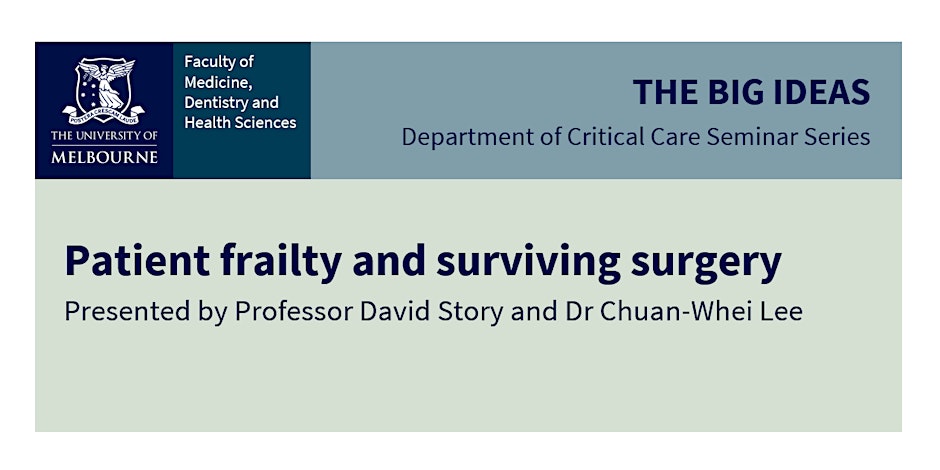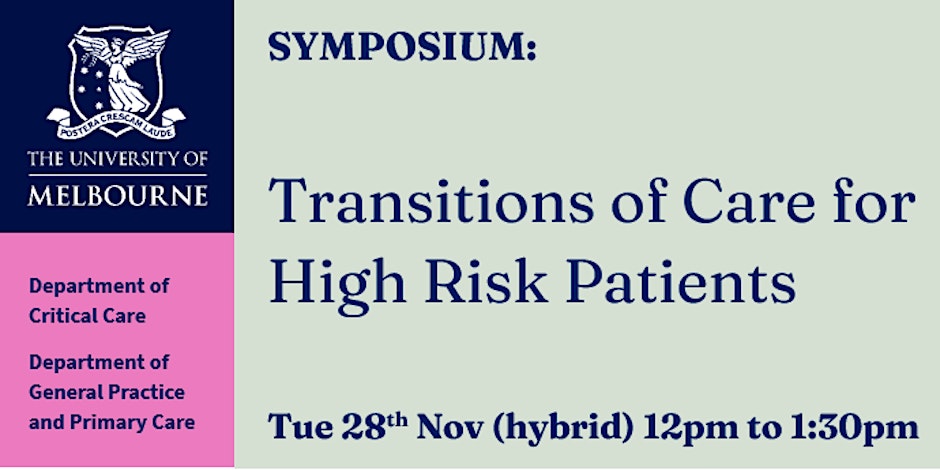Critical Care
Past Events
-
Wednesday 1pm - 2pmThe Big Questions: Network approach to answering the big questions in paediatric emergency and critical care
 Seminar
Seminar -
Wednesday 1pm - 1pmThe Big Ideas: Patient Frailty and Surviving Surgery
 Seminar
Seminar -
Wednesday 7am - 8amPhD Completion Seminar: Dr Steven McGuigan
 Completion Seminar
Completion Seminar -
Tuesday 12pm - 1:30pmTransitions of Care for High Risk Patients
 SYMPOSIUM
SYMPOSIUM -
Thursday 1:45pm - 5:30pmLessons from the Northern Summer: Preparing for extreme heat in Victoria
 Seminar
Seminar -
Wednesday 12pm - 1pmTelehealth-enhanced patient-oriented recovery after ICU
 Lecture
Lecture -
Wednesday 3pm - 4pmCritical Care Honours Information Session
 Study
Study -
Saturday 9am - 4pmHAZMAT and Personal Protective Equipment Workshop
 WORKSHOP
WORKSHOP -
Wednesday 3pm - 6pmCritical Care Connections: Annual Research Symposium
 Event
Event -
Monday
Healthcare Carbon Literacy Workshop and Life Cycle Analysis Masterclass Workshop
Workshop -
Tuesday 4pm - 5pmWomen in Critical Care
 Seminar
Seminar -
Monday 1pm - 2:15pmGraduate Researcher Seminar
 Seminar
Seminar -
Wednesday 3pm - 4pmCritical Care Honours 2023 Information Session
 Study
Study -
Wednesday 3pm - 5pmWebinar: Engaging Diverse Communities in Clinical ResearchWebinar
-
Wednesday 5:30pm - 7pmWebinar: Climate Care and Healthcare
 Webinar
Webinar -
Monday 2pm - 4:30pmWorkshop: Critical Care Meets Biomedical Engineering
 Workshop
Workshop -
Workshop: Counter-terrorism medicine
 Workshop
Workshop -
Friday 9am - 11amSepsis: the big questions
 Seminar
Seminar -
Monday 10:30am - 11:30amPhD Completion Seminar: Scott McAlister
 PhD Completion Seminar
PhD Completion Seminar -
Tuesday 4pm - 5pmCritical Care Honours Info Session
 Information session
Information session -
Thursday 11am - 12pmPreventing Brain and Kidney Injury in Critically Ill Patients
 Seminar
Seminar
The Department of Critical Care promotes multi-centre research with the Departments of Anaesthesia, Intensive Care and Emergency Medicine at the 20 hospitals affiliated with the University. We engage in collaborative and translational research with other clinical and biomedicine departments, Clinical Trials Networks, government and industry.
Featured content
-
Research Themes
Our research priorities are grouped within several key themes, encompassing elements of all critical care disciplines. This multidisciplinary approach aims to increase the opportunities for researchers to collaborate and develop evidence-based, patient-focussed integrated models of care, based on demonstrated clinical and cost effectiveness, where a clear need has been identified.
View -
Research Projects
An overview of current research activity across our network, ranging from audits and observational studies to large clinical trials and our multidisciplinary program to increase research equity for culturally and linguistically diverse patients.
View
Featured content
-
Coursework Degrees
Our coursework degrees are tailored to the workforce needs of the critical care community. We offer a dedicated Critical Care Honours stream for the Bachelor of Biomedical Sciences, and a Specialist Certificate, Graduate Certificate and Graduate Diploma in Disaster and Terror Medicine.
VIEW -
Graduate Research Degrees
Enrolling in a graduate research degree with the Department of Critical Care is the perfect way to begin or progress your career. Current PhD students are conducting research on diverse topics, from frailty to meta analyses and publication outcomes; environmental costs of critical care to non anaemic iron deficiency.
VIEW -
Workshops and Short Courses
Enrol in one day workshops in Healthcare Carbon Literacy, Life Cycle Analysis, Disaster and Terror Medicine and more...
VIEW
Featured content
-
Honorary appointments
We welcome applications for honorary appointments from individuals who make a significant, sustained contribution to the Department of Critical Care in at least two of the three following areas: Learning and Teaching; Research; Leadership.
View -
Awards and prizes
Awards offered by the Department of Critical Care include the ANZCA Melbourne Awards for emerging anaesthesia researchers and the Kate Leslie Research Award for Honours students.
View -
Alumni
Our alumni community brings together health professionals from around the world. Stay connected with this global network and access alumni benefits, news, exclusive events and more.
View -
Donate
There are many ways to support the work of the Faculty of Medicine, Dentistry and Health Sciences, including donations that support students and academics, or gifts of valuable memorabilia that enrich our museums. We are grateful to our donors for their help creating scholarships, supporting ground-breaking research, building important partnerships and assisting community engagement.
View

Welcome
Welcome to the Department of Critical Care (DoCC) within the Melbourne Medical School. DoCC is one of the few University departments anywhere in the world that embraces all three critical care specialties: anaesthesia, emergency medicine, and intensive care medicine. DoCC covers over 20 hospitals affiliated with the University.
The need for DoCC stems from the unfortunate fact that many high-risk, deteriorating, and critically ill patients have poor outcomes. Collectively these patients have a broad range of problems from trauma to children with sepsis to mental health to severe co-morbidity before surgery to complex pain syndromes; to name a few. Both preventing and managing health care crises is a key common feature of the three critical care specialties.
Through research, education, engagement, and direct clinical care, DoCC will improve individual patient journeys, public health, cost effectiveness, and workforce well-being. Our Department collaborates across academic, political, government, and community sectors including nurses, allied health practitioners, scientists, leaders, and of course patients and the broader public.
The academic history of critical care of the University of Melbourne extends back over 120 years to Dr Embley’s landmark 1902 article on death during chloroform anaesthesia. While there have been many subsequent great strides in critical care education, research, and clinical care in the University of Melbourne environment, DoCC represents a big step in creating an internationally recognised centre of excellence for integrated academic critical care.
Professor David Story, Inaugural Head of Department
Our people
Our leadership team oversee the three, integrated research and teaching streams, harnessing the expertise of a large network of more than 200 critical care specialists undertaking clinical care, research and education at more than 20 University-affiliated hospitals.


Sustainable healthcare
Our department is home to world leaders in environmentally sustainable healthcare. Creating high-quality, low carbon healthcare practice and policy change through research, teaching and engagement. Focus areas include addressing low value care through quality improvement, implementation of practice changes and healthcare carbon footprinting (life cycle assessment).
Diversity and Inclusion
The Melbourne Medical School is proud to foster a vibrant and inclusive culture delivering initiatives that value and support diversity.

